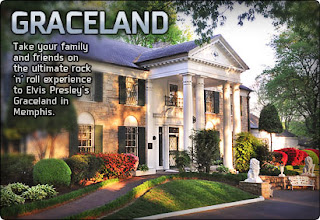As the most visited private residence in the country, Graceland is the go to site for many true Elvis fans. As of 2005 the home was drawing in roughly 650,000 visitors annually. Filled to the brim with every must have accessory of its time, “the King’s” castle has taken its place as one of the top visited museums in the country.
Graceland was not originally Presley’s innovation. First owned by the Toof family, it was named after their daughter, Grace. Toof’s niece, Ruth More, owned the land and built the mansion before selling it to Presley in 1957.Presley spent a good deal of his life in this home. From the time he moved, in his early twenties, to the day he died in 1977, this was the permanent residence of Elvis Presley for two decades of stardom. This is where he lived as a newly wed to his young bride, Pricilla Presley, and where, as Gilbert Rodman suggests in his book Elvis after Elvis, he built his reputation as “The King of Rock ‘n’ Roll.” While Presley began developing his fame and fortune prior to moving to the Memphis mansion, he is unique among stars in that he chose to continue residing in his de facto home town. He had seen New York and visited California. He knew his options, but he chose to be near to his fans. “Perhaps the most important effect Graceland had on Elvis’s public image is that it gave his stardom a stable, highly visible, physical anchor in the real world” (Rodman, 99). Writer McKenzie Wark argues that Presley’s southern home had a large impact on his fan-base attachment along with his musical style. Though he grew up a white child in the segregated south, he was able to maintain the predominantly black sound of Rhythm ‘n’ Blues in his flashy music. This is attributed to the cultural availability of such a style in the south. It was this culture that first began to impress his audience, this was a possible reason that he chose not to leave the south. “In the end nobody knew exactly how many times in a row he played the song or how many airings it received before his show ended at midnight,” author Ponce de Leon writes in regards to Presley's first hit That’s Alright, a song originally by R&B singer Arthur Crudup. “But one thing was certain: people, white and black, heard the music and responded without knowing the race of the singer” (Ponce de Leon, 43).
 Graceland is quite a sight. Albert Goldman, who was not a fan, once said that nothing in that home was “worth a dime.” This statement refers to the plethora of trinkets and gismos that fill every available space, however, in reality this is far from true. The home itself is worth several millions today. In’57 when Presley acquired the property he paid $102,000 for it. Visitors to Graceland see much more than just the 5 bedroom mansion. The tour includes a visit to Elvis’s automobiles, his custom jets, a memorabilia showcase and his nearby garden where he is buried with his family.
Graceland is quite a sight. Albert Goldman, who was not a fan, once said that nothing in that home was “worth a dime.” This statement refers to the plethora of trinkets and gismos that fill every available space, however, in reality this is far from true. The home itself is worth several millions today. In’57 when Presley acquired the property he paid $102,000 for it. Visitors to Graceland see much more than just the 5 bedroom mansion. The tour includes a visit to Elvis’s automobiles, his custom jets, a memorabilia showcase and his nearby garden where he is buried with his family.“Memphis is not something you just see or hear. You feel Memphis. Walk around downtown and let it soak up through your feet. Eat some Bar-B-Q. Put some gin in your glass. Sit back and let it happen.”- Memphian musician Jim Dickson.
Rodman, G. (1996). Elvis after Elvis: The posthumous career of a
living legend. London, England: Routledge
Ponce de Leon, C. (2006). Fortunte son. New York, NY: Hill
and Wang
On Graceland: